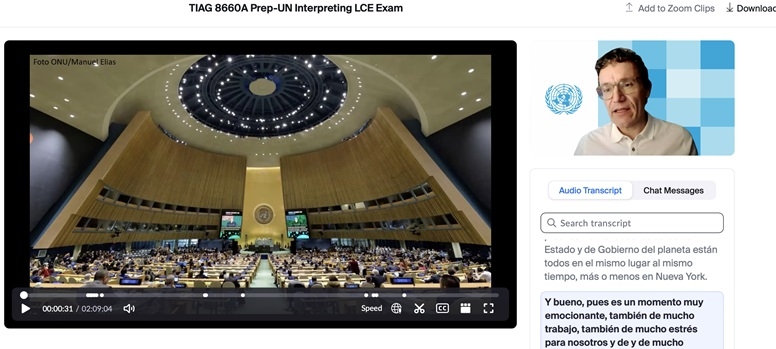Two Alums Pass Difficult United Nations Interpretation Exam
| by Darcy Morter
Two Middlebury Institute alumni in the Conference Interpretation program have passed the demanding exam required for United Nations interpreters.

When Leire Carbonell graduated with a degree in conference interpretation from the Middlebury Institute in 2003, her dream was to work as an interpreter at the United Nations.
That meant passing the United Nations’s Competitive Examinations for Language Positions (CELPs).
“When I graduated, I didn’t know how to study for this exam,” said Carbonell, who now teaches Spanish interpretation at the Institute. “That’s why I wanted to create a class to help my students build the experience needed to pass.”
Carbonell works as a freelance interpreter for the United Nations and has also worked for the International Olympic Committee, Stanford University, and companies such as Google and Microsoft—leveraging her specialization in interpretation for the IT field.
Several Middlebury Institute translation and interpretation faculty work as freelance conference interpreters at this high level. Christiane Abel (French) has interpreted at the UN International Criminal Tribunal and Cas Shulman-Mora (Spanish) worked at the United Nations Economic Commission for Latin America and the Caribbean. Both Wei Ding (Chinese) and Andrea Hofmann-Miller (German) translated for the U.S. State Department, while Hofmann-Miller also worked for the German Parliament.
Natalia Morawski shares her experiences in the translation and interpretation program.
“It’s no mystery that this is one of the most challenging [translation and interpretation] programs. It’s hailed as one of the best in the world,” said Anahni Harris, a current student who took the workshop in January. “What makes this experience so unique is all the people who have come through this Institute and formed a Middlebury family. It’s a lifelong connection that you have.”
Studying speeches and analyzing regional accents are part of what it takes to be a professional interpreter. But when you’re aiming for the pinnacle of the profession, there is far more to learn and few structured resources to help aspiring interpreters prepare.
In 2009, Carbonell developed a special prep workshop to help students who aspired to work at the UN. Middlebury Institute has had a memorandum of understanding with the UN on cooperation in the training of language professionals for 16 years. This course aims to help interpreters prepare for challenging UN examinations, but cannot, of course, guarantee success.
“If you want to be a conference interpreter, everybody dreams of working for the UN,” Carbonell said. “The values of the UN and Middlebury Institute are very similar: to foster international peace and mutual understanding.”

The weeklong, in-person workshop helps students learn the exam’s requirements and develop a methodical process to study. Students also complete a mock exam and become familiar with the UN Charter and how the organization works.
The workshops usually fill up each year. Two workshops are available for those with Spanish in their language combination, and one for those with Chinese as their “A” language, or native language. Carbonell led the Spanish group while Professor Emeritus Chuanyun Bao, a former staff interpreter for the UN in Geneva, Switzerland, led the Chinese group.
“This workshop was buzzing with energy and seeing the students learn from the top professionals was a real highlight,” said Bao.
The Institute’s translation and interpretation students nearing the end of their program can attend for free.
As she nears the end of her graduate studies, Kyana Waters appreciates that the Middlebury Institute has both helped her build skills and a network.
This year, Carbonell was able to secure presentations from a number of guest speakers, including Patricia Fernández Abenoza, a librarian at the Dag Hammarskjöld Library at UN headquarters, about the different resources available and how to conduct effective research.
Adrián Delgado MATI ’93, the current chief of the UN’s Spanish booth at UN headquarters and a Middlebury Institute alumnus, also addressed the class. In total, Delgado and five UN interpreters participated in this year’s course.
Workshop participant Jiahui Lin said the involvement of current UN interpreters was invaluable.
“Having them listen to our practice and provide feedback and suggestions was an incredible experience,” Lin said. “The combination of expert guidance and hands-on training made this workshop especially rewarding.”
Master of Arts in Translation; Translation and Interpretation; Conference Interpretation
| by Darcy Morter
Two Middlebury Institute alumni in the Conference Interpretation program have passed the demanding exam required for United Nations interpreters.
| by Matthew Jennings
How recent Middlebury Institute graduate Gustavo Mercado MACI ’19 passed one of the United Nation’s most difficult interpretation examinations.
| by Winnie Heh
A recent Conference Interpretation graduate discusses life as a professional interpreter, detailing how he passed a notoriously difficult United Nations exam and what that means for his career.